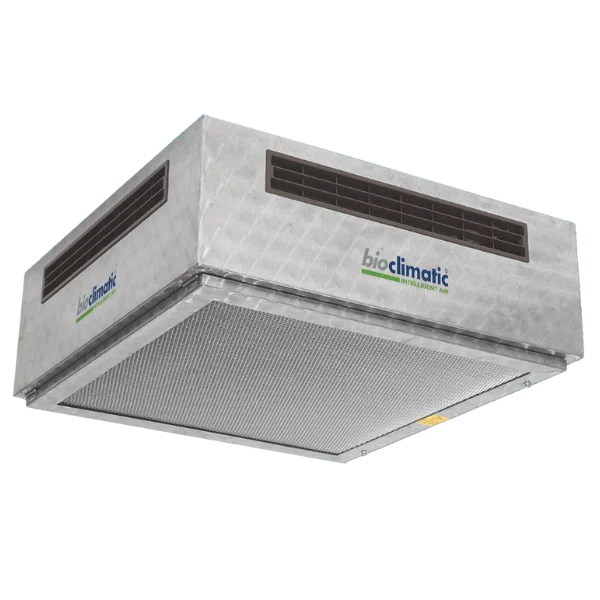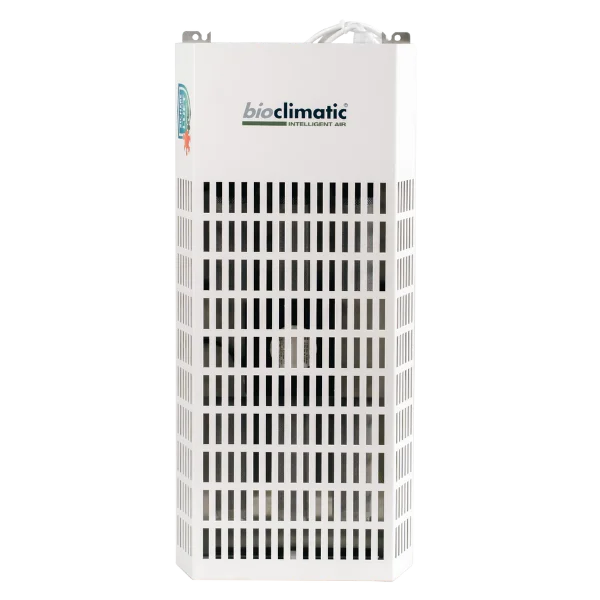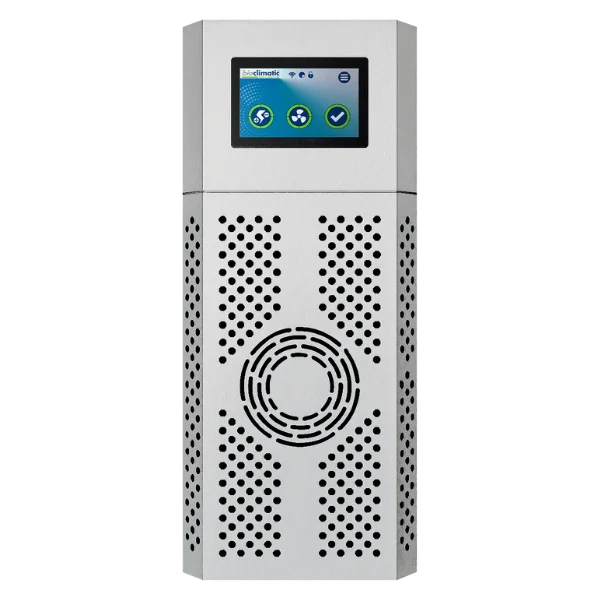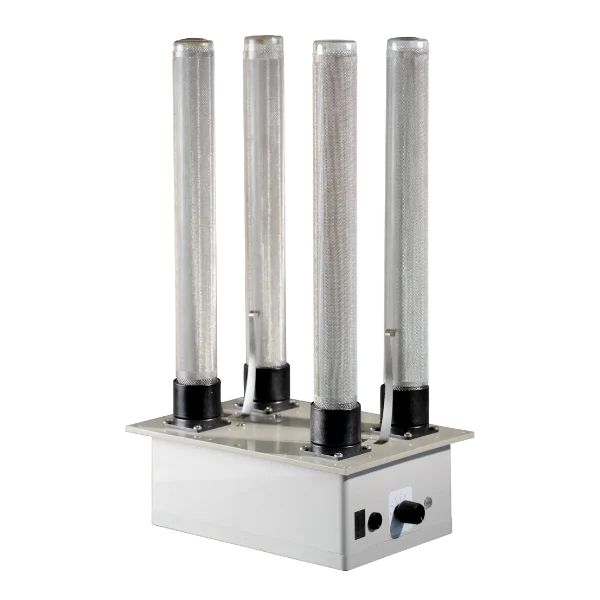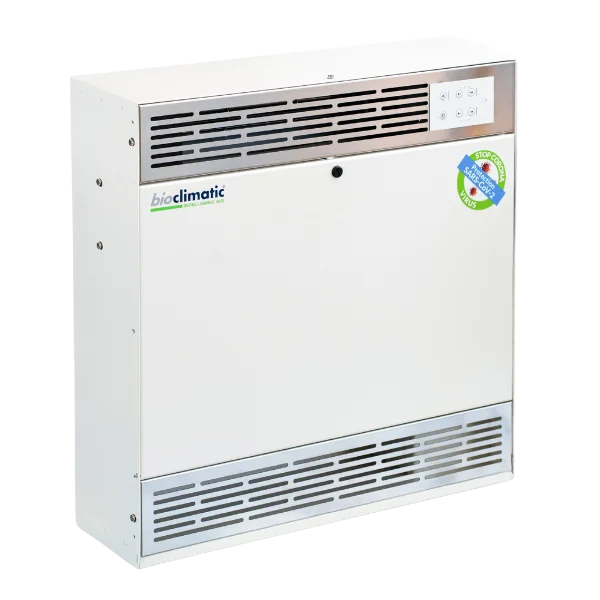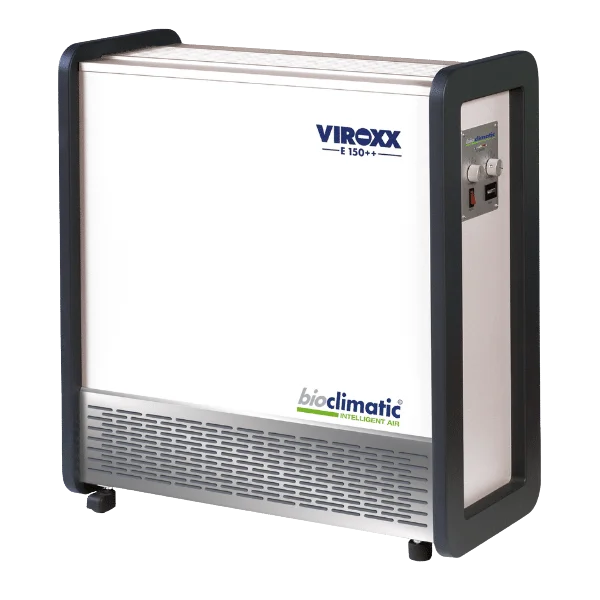Optimum hygiene – air purifier animal shelter
No filters, no chemicals, no magic – just clean air! Our air purifiers for animal shelters reduce pollutants, odors and germs.
Our air purifiers for the animal shelter
When many animals of different origins live together in a confined space and new animals are constantly being added, it is particularly important to maintain a high level of hygiene with the help of air purifiers for the animal house.

Advantages of our air purifiers
- Fewer odours – Neutralizes unpleasant odours for a pleasant ambience.
- Fewer sick days – clean air has been proven to reduce sick days.
- Increased well-being – a positive air experience improves the quality of life.
- Germ reduction – Inactivates viruses, bacteria, fungi and spores.
- Low maintenance costs – no filter change, minimal cleaning effort.
- High air quality – pollutants are directly inactivated.
- More safety – Reduces the risk of infection, even on surfaces.
- Quick set-up – installation without major structural measures.
- Environmentally friendly – no chemicals, no filters, no hazardous waste.
- Efficient – low energy consumption with maximum effect.
Fresh air for your animal shelter
The current situation in animal shelters is a challenge, as many facilities are faced with a large number of animals waiting for a loving home in a limited space. Clean and healthy air quality therefore plays a key role in animal shelters. More and more animal shelters are turning to modern air purifiers to help create a healthier environment.
AeroMat
AeroTec
AeroTec2
AeroTron
AirCleanerQ
Viroxx E150++
What our customers say








Interesting facts about our air purifiers for the animal shelter
The challenges of air quality in animal shelters
Every day, dedicated employees and volunteers work to ensure that the animals in shelters are as well off as possible despite their tragic fates. Nevertheless, there are factors that affect the welfare of animals – albeit unintentionally and often unknowingly. These are pollutants that are present in the air and can have unexpected effects on the health of animals and people who regularly visit the shelter.
As animal shelters often house a large number of animals in a limited space, some factors that contribute to poor air quality can hardly be prevented in the first instance. For example, animals in shelters cannot be regularly groomed, which increases the shedding of hair, feathers and dandruff.
In addition, stress and tension experienced by the animals due to the unfamiliar environment and separation from their owners or familiar habitats can lead to increased hair loss. Added to this are animal droppings and urine, the animals’ natural excretions, which cause unpleasant odors. All these factors mean that an animal shelter has to be constantly cleaned. The damp environment is in turn an ideal place for mold spores, which can thrive on damp walls and other surfaces. Not to mention the dust that is stirred up in the process or the harmful chemicals that are produced by cleaning and disinfecting agents and settle as fine particles.
Germs in the form of viruses and bacteria represent another potential challenge for air quality in animal shelters. These are not only brought into the shelter from outside by staff and visitors, but also enter as aerosols through open windows or ventilation systems. All these factors contribute to polluted air and underline the importance of effective air purification in animal shelters in order to create a healthy and hygienic environment for everyone involved.
Effects of poor air quality on animals and humans
Poor air quality is not only unpleasant, but can have a significant impact on both animals and humans. In indoor environments, including animal shelters, harmful substances such as dust, allergens, mold spores and chemical odors can increase air pollution. Dogs, cats and other creatures in the facility are susceptible to respiratory problems and allergic reactions.
At the same time, employees and visitors who work in this environment or visit the animals can also experience such health impairments. Furthermore, a concentration of viruses and bacteria in the air favors the spread of infections. To ensure the well-being of the animals and the health of everyone, it is therefore crucial to promote good air quality in animal shelters.
Effects on the health of the animals
Poor air quality has a significant impact on quality of life and health. The high concentration of dust, allergens and mold spores can lead to symptoms of respiratory diseases in pets. This is particularly serious if allergic reactions also occur. These further impair the quality of life, and the dogs, cats and small animals living there have already suffered enough.
In addition, such polluted air can cause stress, which, in combination with the unpleasant environment for the animals, may cause nervousness and fear. Some animals show enormous changes in behavior. They withdraw, become restless or even aggressive. All these health problems can make it difficult to adopt animals, as potential adopters prefer healthy and happy animals. Therefore, it is crucial to improve the air quality in animal shelters. A clean and healthy environment supports the well-being of animals and increases their chances of finding a loving home.
Effects on the health of employees and visitors
Of course, it is not only the animals that are affected by poor air quality, but also the staff and visitors to animal shelters. Harmful substances such as dust, pollen and chemical odors irritate the respiratory tract and trigger allergies – as does animal hair, which enters the mucous membranes and lungs via the respiratory tract. Employees who work in a polluted environment for long periods complain of respiratory problems, headaches and fatigue. Added to this are unpleasant odors, which reduce the general satisfaction of visitors and have a negative impact on their experience at the shelter.
In the long term, regular exposure to poor indoor air can lead to health problems and increase the risk of respiratory diseases. So it’s clear that a healthy working environment is vital for employees to maintain their performance and productivity. In addition, a pleasant atmosphere helps to encourage visitors to adopt the animals and support the shelter.
Air purification measures in the animal shelter
There are various air purification measures in animal shelters to improve air quality:
- Ventilate regularly: Natural ventilation through open windows and doors enables air exchange and improves the air quality in the rooms.
- Mechanical ventilation: Technical devices such as ventilation systems can also remove stale air and introduce fresh air to minimize pollution.
- Air purifiers: Air purifiers can reduce or even neutralize bacteria, germs, viruses and allergens and thus significantly improve air quality.
- Room design and organization: Appropriate room design and organization can prevent the accumulation of dust and pollutants. Separating animals during cleaning is particularly helpful here.
- Environmentally friendly cleaning agents: The use of environmentally friendly cleaning agents and disinfectants prevents the spread of toxic chemicals during cleaning.
- Air locks: Installation of air locks to control the air flow and prevent the transfer of harmful substances from one area to another.
- Quarantine areas: They help to minimize the spread of easily communicable diseases and protect air quality.
These measures are no guarantee that they will remove or eliminate all pollutants from the air. On the other hand, specially developed air purifiers are much more effective. They effectively remove pet odors, animal hair, mould spores, dust and other pollutants and thus make a significant contribution to improving the indoor air.
Air purifiers for animal health
Air purifiers with bipolar ionization are particularly suitable for animal health in animal shelters. Bipolar ionization enables the effective removal of harmful substances such as viruses, bacteria, mould spores and allergens from the air. This is particularly important in places where a large number of animals live in a confined space and the air can quickly become contaminated with potentially harmful particles. These devices work quietly and unobtrusively in the background so that they do not interfere with ongoing operations and therefore do not cause any discomfort to humans or animals.
Preventing the spread of disease is also an important aspect. Air purifiers with bipolar ionization can help reduce the spread of disease in animal shelters. The technology kills microorganisms in the air, minimizing the risk of infection and transmission of pathogens between animals. There are also mobile air purifiers. Their flexibility and mobility is another plus point. The devices can also be positioned flexibly as required. Depending on the size of the room and the number of animals, the air purifiers can be strategically positioned to ensure the best air quality in different areas of the animal shelter.
